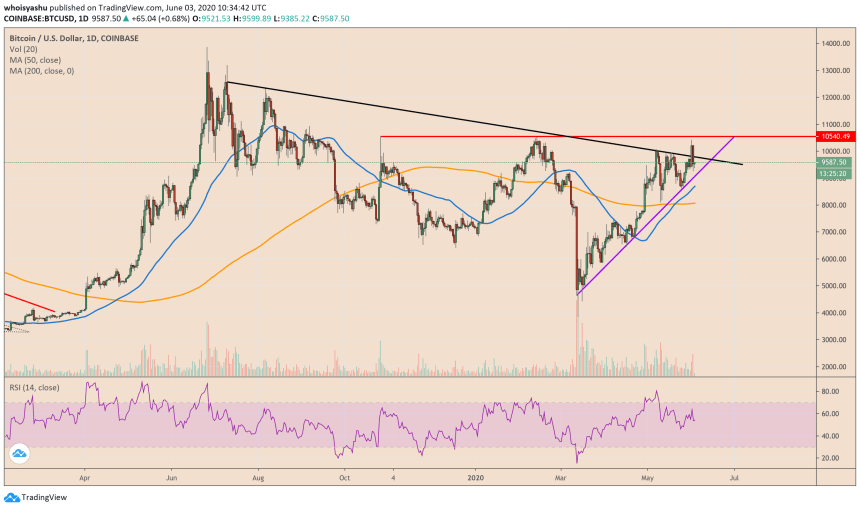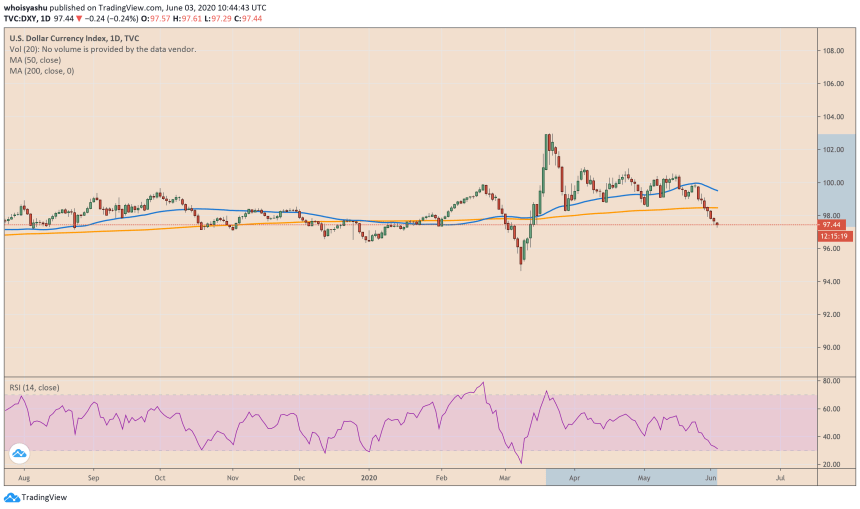- Bitcoin repeatedly failed to hold its prices above $10,000 since February 2020.
- The cryptocurrency on Tuesday fell by more than $1,000 from its quarterly high above $10,400, logging another upside rejection above the $10K level.
- But a stark US dollar warning could send investors back to Bitcoin and other risky assets, helping it break and hold the $10K support.
Bitcoin broke below $10,000 – all over again.
The flagship cryptocurrency jumped the six-figure level on Tuesday, extending its move towards a new quarter-to-date high at $10,428. Nevertheless, traders used the price rally as their gateway to extract attractive short-term profits. A massive sell-off ensured near the top, causing bitcoin to fall to as low as $8,600.
The pullback was not a new thing for Bitcoin bulls. The cryptocurrency turned away from pursuing a price rally above $10,000 for about twelve times since October 2019. So it seems, spot traders’ upside bias loses momentum near the said level – they ignore buying bitcoin at or above $10,000.

There are no specific reasons that explain those fears – except a separate, long-term descending trendline bitcoin has failed to break above since December 2017.
It is safe to assume that pullbacks near the $10K level are emotionally-driven. The market can invalidate them only if traders begin to see a long-term upside for the cryptocurrency. Fortunately, a Wall Street warning is taking the Bitcoin sentiment right into bullish territory.
The Risky US Dollar
A weak dollar could be a recipe for a stronger Bitcoin, at least per their recent trend behaviors.
The bitcoin price crashed in February and March trade by more than 60 percent. The dramatic fall came in the wake of a global pandemic that sent economies into a lockdown state. Investors panicked and sold-off their risky positions to seek shelter in what they believed was the best safe-haven during a crisis: the US dollar.
As bitcoin, equities, and even gold suffered during the Q1’s global market rout, the US dollar index rose 8.81 percent. Nevertheless, the Federal Reserve’s decision to introduce an infinite stimulus package put some pressure off the investors. That resulted in capital outflow back into risky assets.
As a result, bitcoin, the S&P 500 index, and gold all rose in tandem. At the same time, the US dollar index fell 5.49 percent from its YTD top.

The flipping dollar behavior prompted Wall Street firms to give a more bearish outlook for the greenback.
Strategists at Goldman Sachs recommended its clients to position for dollar downsides in their portfolios. JP Morgan & Chase, too, suggested the same, adding that easing lockdown measures and reopening of the economies would keep the dollar weak.
“We no longer have the confidence to stand in the way of this optimism and further neutralize our previously defensive trade recommendations,” the bank wrote in a client note .
Growth Call for Bitcoin
If the global economy is bottoming out, it will make investors short the US dollar and move their capital back into risky assets. That may benefit Bitcoin.
The cryptocurrency is climbing as a long-term safe-haven asset against the possibilities of inflation caused by the Federal Reserve’s open-ended stimulus package. Investors looking to move past lower yields offered by their safe but boring U.S. Treasury bonds could also pick Bitcoin for its higher risk-reward profile.
The long-term sentiment makes it like for the cryptocurrency to retest $10,000 – or move beyond it to eye higher levels.












